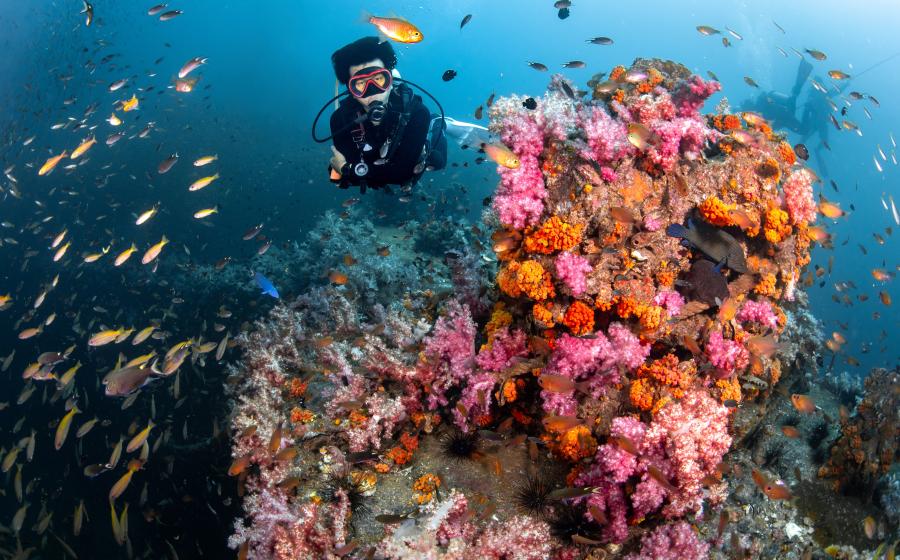Can I Dive With Asthma, Diabetes, Cancer, or Heart Disease, and after suffering DCS and Pneumothorax?

Dive doctors and operators have long lowered their own risk by limiting yours when certain medical conditions enter the picture. Asthma? Sorry, no dice … or dives. Ditto for diabetes, heart disease and other conditions that increase the odds of something going wrong down below.
But the tide is slowly turning. For more than two decades, the Divers Alert Network has compiled information on divers from around the globe, many who continued diving despite disqualifying diseases. Likewise, dive doctors and scientists like those belonging to the Undersea & Hyperbaric Medical Society (UHMS) have conducted their own studies.
"When we first started devising prescriptive guidelines for who was fit to dive and who wasn't, we didn't have hard data, so all the axioms were based on theoretical risk," says Edmond Kay, M.D., a diving medical officer at Seattle's University of Washington. "We now have facts and figures." He has studied dive fitness for the past 20 years, and in that time, he has seen a lot of changes in the way medical professionals approach diving with certain conditions. "The thinking has turned from 'If you have this disease, you can't dive' to 'If you have this disease, you must be able to manage the symptoms, and then you may be fit to dive.'"
Kay helps us explain the newest approaches for managing some of the most common dive disqualifiers.
Diagnosis: Asthma
Back in the day, if you mentioned asthma to a dive instructor, you'd likely hear a firm "No, you can't dive." The disease affects those all-important diving organs, the airways, making them inflamed and susceptible to irritation. At its worst, asthma attacks tighten the muscles around your airway and constrict airflow to the point where you can barely breathe. Therein lies the risk. A number of factors inherent to diving can trigger an attack, including exercise and breathing cold and/or dry air, and an underwater attack can easily escalate to panic and drowning. Doctors theorized that this narrowing of the airways could also trap breathing gas in the lungs, which could expand before it could be exhaled during ascents, causing lung-expansion injuries. However, data presented during a 1995 international asthma symposium sponsored by UHMS showed no increased risk for lung injuries among asthmatic divers.
Diving with asthma: Anyone with severe asthma — meaning they have daily, chronic symptoms — should not dive. If your asthma is mild, intermittent and controllable, you may get clearance if you can show that you're functionally normal — that you manage it with medication to the point that exercise and typical asthma triggers don't cause an incident.
Today, DAN estimates about 4 to 5 percent of the diving population has asthma. To see if you qualify, take an airway challenge — a test where you exercise at increasing intensity on a treadmill, while a doctor measures your airflow to ensure you're stable even during vigorous exertion. You'll also need to show stability when exposed to triggers like cold, dry air, which is what you breathe from a scuba tank, Kay says.
Talk to your doctor about dive-friendly medications. Aminophylline, an older oral medication that opens air passages in the lungs, not only dilates the smooth muscles of the airways but also the arteries in the lungs, which decreases your lungs' ability to filter bubbles and increases your risk for DCS. Newer medicines, bronchodilators like Albuterol for example, can relax the airways for four to six hours and haven't been found to dilate the arteries in the lungs, Kay says.
Diagnosis: Diabetes
Years ago, divers with diabetes were shut down on the dock. This disease stops or limits the body's ability to produce insulin, the hormone that converts sugar and carbohydrates into energy, and even with insulin treatment, people who have insulin-dependent diabetes can suffer from dramatic swings in blood sugar, including episodes of low blood sugar that can cause dizziness, confusion, anxiety and in some cases loss of consciousness — all potentially disastrous should they happen underwater.
Diving with diabetes: Like asthma, diabetes is a disease of degrees. In some cases, it can result in vascular disease, which narrows the blood vessels in the arms, legs and certain organs, or even organ damage. If you have medical complications related to diabetes, chances are you can't dive, but if your disease is well managed and you follow a careful dive-day protocol, you're more likely to be cleared.
To check your fitness to dive, consult a doctor well versed in both diving and diabetes. Then start slow. Wait three months after starting oral hypoglycemic agents (OHAs) and one year after starting insulin therapy before your first dive. You should also be free of any serious episodes of hypoglycemia (low blood sugar) or hyperglycemia (dangerously high blood sugar that can result in diabetic coma) for one year. On dive day, check your glucose level 60, 30 and 10 minutes before going in, and then one time as soon as possible afterwards. It should be at least 150 milligrams per deciliter/8.3 millimoles per liter. If it's less than that, or if the average level falls between two of the measurements--a sign that your blood sugar levels are unstable and dropping--don't dive. Also stay ashore if your blood sugar is too high, above 300 mg/dL or 16.7 mmol/L.
Even if you're cleared to dive, dive conservatively. DAN cautions divers with diabetes to avoid exertion that may send blood sugar plummeting; dives lasting 60 minutes or more, depths of more than 100 feet, cold water and other arduous conditions fall into this category. Check out the complete guidelines on DAN's web site.
Diagnosis: Heart Disease
Heart disease is a large umbrella that includes atherosclerosis (hardening of the arteries, which accounts for about three-quarters of heart problems), as well as previous heart attacks, abnormalities of the heart valves and heart-rhythm problems. Divers with heart disease run the risk of fatal heart attacks in the water, as well as nonfatal heart attacks and chest pain that can lead to panic and drowning. Dive operators can and will deny people who've had heart attacks or report heart disease. Though it remains the leading killer of divers, and the risk of death is a very serious consideration, this diagnosis no longer immediately precludes diving.
Diving with heart disease: DAN recommends waiting six months to a year after a heart attack or heart surgery before considering diving again. Then you should test your dive fitness with a stress test, Kay says, where your heart function is monitored while you exercise at increasing intensity on a treadmill. "If you can reach an exercise intensity of 13 METS (the exertion equivalent of running a 7.5-minute mile), your heart is strong enough for most any exertion," he says. You also need to be symptom-free. If you have chest pain, lightheadedness or breathlessness during exertion, you should not be diving. Blood-thinning heart medicines may require more conservative dives because they increase the risk of excessive bleeding in the case of ear, sinus or lung injuries. "Blood thinners like Warfarin can also turn DCS into a more serious situation as a bubble can cause hemorrhaging into the spinal cord or brain," Kay says. Stay conservative and well within safe diving limits.
Diagnosis: Cancer
Many doctors remain unsure when — or even if--their cancer patients can safely return to diving. The disease is characterized by out-of-control cell growth that can cause tumors and destroy healthy tissue, and depending on what type of cancer you have — for instance, lung cancer — cause permanent organ damage that could disqualify you from diving. Cancer treatments, surgery, radiation therapy and chemotherapy carry their own unique risks, but if all goes well, there's a chance that you can safely return to diving.
Diving after cancer: You should wait until you're done with therapy and back on your feet before you consider going back in the water, Kay says. "Chemo and radiation therapy can wipe out your stamina. It may take a full year before you recover your energy and exercise tolerance." Certain chemotherapy drugs can increase your risk for cardiac and pulmonary toxicity should you need hyperbaric oxygen therapy while taking them, and chemotherapy suppresses the body's immune system, leaving you vulnerable to infection. "You should be fully recovered before being exposed to the ocean and its myriad pathogens," says Kay.
Once you're fully healed, ask your doctor for a lung assessment to ensure you don't have residual damage that may predispose you to lung injuries. "Radiation treatment and certain chemotherapy drugs can also cause pulmonary fibrosis, an inflammation of the lungs that causes scarring and stiffening of the lung tissue," Kay says. Pulmonary fibrosis can also cause shortness of breath and pulmonary hypertension — dangerously high pressure inside the lungs that can cause serious side effects like heart damage — and it can develop months after you've completed chemotherapy or radiation therapy, so it's important to give yourself plenty of time before you take steps to resume diving.
Diagnosis: Pneumothorax
Your lungs are obviously essential organs during diving, so anything that compromises their ability to function is always taken very seriously. In the case of pneumothorax (collapsed lung), whether or not you'll dive again depends on the root of the injury. If you sustained a spontaneous pneumothorax, which can happen in otherwise healthy people as the result of a congenital defect in the lung, you should never dive once the disease is recognized. The odds of recurrence are simply too high to risk your life. If, however, your pneumothorax resulted from a trauma like a punctured lung, Kay says you might dive again, provided you heal good-as-new.
Diving after pneumothorax: You'll need a full lung assessment. That includes an x-ray and high-resolution chest scan, as well as lung-function tests. "If all checks out, then you're not at increased risk for spontaneous pneumothorax and you can go back in the water," Kay says.
Other lung injuries, like pulmonary embolism, must be assessed on a case-by-case basis. For pulmonary embolisms that result during extended air travel for instance, you may need a blood thinner like Warfarin for an extended period of time. As mentioned earlier, this can increase your risk for certain hemorrhagic dive injuries. You'll also need further assessment to measure your risk of developing another embolism while diving.
Diagnosis: DCS
In any given year, DAN receives about 300 reports of decompression sickness. Getting back in the water depends on the severity of the hit, how quickly it was resolved and whether or not the DCS was "deserved." Diving too soon after a bout of DCS, or without understanding what caused the bends, can set the stage for another, perhaps more serious, hit.
Diving after DCS: The doctors at DAN say if you sustained pain-only DCS and your symptoms resolved after recompression, you're likely clear to dive after four symptom-free weeks. If you also had cardio-respiratory or neurological symptoms such as weakness, numbness or confusion, you should be symptom-free for at least six weeks before diving again.
Always get checked for any underlying medical conditions that may predispose you to DCS before you resume diving. If you had a significant neurological injury, you shouldn't dive again. Likewise, if you had a true "undeserved hit," meaning you carefully followed all the rules and still got bent, you shouldn't dive until you undergo a full medical evaluation to determine the underlying cause.
Medical Symbol / Dive Flag courtesy of Shutterstock.com










